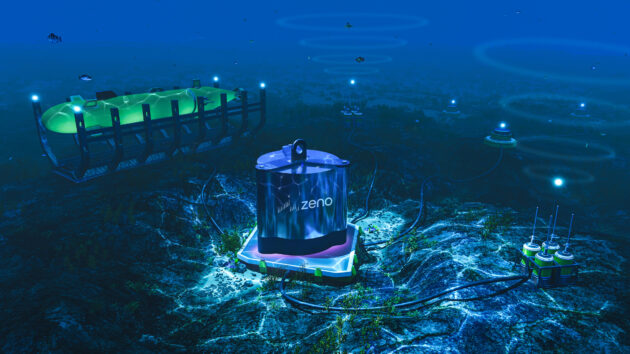
Zeno Power says it’s been awarded a $7.5 million contract from the Department of Defense to build and demonstrate a radioisotope power system that can provide distributed power on the seabed.
The program, funded through the Pentagon’s Operational Energy Innovation Office and the Office of Naval Research, calls for the demonstration to take place by 2025.
Zeno maintains offices in Seattle as well as Washington, D.C., and one of its partners in the program is Jeff Bezos’ Blue Origin space venture, which is headquartered in Kent, Wash.
The objective of the program — known as Distributed Energy Provided Throughout the Seas, or DEPTHS — is to develop decentralized nodes for energy generation and distribution on the seabed. Such a system could open the way for long-endurance seafloor sensor systems and charging stations for autonomous undersea vehicles.
“Through the DEPTHS program, Zeno Power will demonstrate a commercially developed radioisotope power system to enable critical sensing and other seabed capabilities for Navy applications,” retired Navy Adm. John Richardson, former chief of naval operations and a member of Zeno’s advisory board, said today in a news release. The world’s oceans are increasingly becoming hotbeds of international competition, and ubiquitous access to power in maritime environments is critical to maintaining U.S. leadership.”
Radioisotope power systems have long been used for undersea applications as well as space applications. For example, in the 1960s and ’70s, the federal government used generators fueled by strontium-90 to power navigational buoys and undersea sensing equipment. Last week, Zeno announced that it had successfully demonstrated its next-generation strontium-90 heat source at Pacific Northwest National Laboratory.
In addition to Blue Origin, Zeno’s partners on the DEPTHS team include Kent-based PowerLight Technologies, Ohio-based Sunpower and the University of Dayton Research Institute.
In May, Zeno won a $30 million public-private package of funding to build a radioisotope-powered satellite for the U.S. Space Force by 2025. And in July, NASA awarded $15 million to Zeno, Blue Origin and Sunpower to work on a radioisotope power system suitable for use on the moon.
Tyler Bernstein, Zeno’s co-founder and CEO, said the DEPTHS program “will meet a critical need for advanced nuclear technologies to power new scientific and national security missions in maritime environments.”
“This contract, along with our current programs with the Space Force and NASA, underscores our ability to build and deliver operational systems to a broad set of government and commercial customers by 2025,” Bernstein said.

